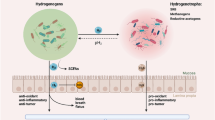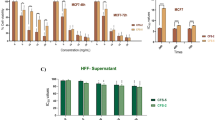Abstract
Enterotoxigenic Bacteroides fragilis (ETBF) is believed to promote the malignant process of colorectal cancer (CRC), but the underlying molecular mechanism still needs to be revealed. CRC cells (SW480 and HCT-116) were treated with ETBF strain. Cell proliferation, invasion and, migration were evaluated by cell counting kit 8 assay, EdU assay, colony formation assay, transwell assay, and wound healing assay. Protein expression was analyzed by western blot. MicroRNA (miR)-139-3p and histone deacetylase 3 (HDAC3) expression levels in tissues and cells were determined by qRT-PCR. Xenograft tumor model was conducted to evaluate the effect of miR-139-3p on CRC tumor growth. ETBF treatment could promote CRC cell proliferation, invasion and migration. MiR-139-3p expression was decreased by ETBF, and its overexpression reversed the effect of ETBF on CRC cell progression. HDAC3 negatively regulated miR-139-3p expression, and its overexpression facilitated CRC cell behaviors via reducing miR-139-3p expression. Moreover, HDAC3 expression was increased by ETBF, and its knockdown also abolished ETBF-mediated CRC cell progression. Additionally, miR-139-3p overexpression could reduce CRC tumor growth in vivo. ETBF aggravated CRC proliferation and metastasis via the regulation of HDAC3/miR-139-3p axis. The discovery of ETBF/HDAC3/miR-139-3p axis may provide a new direction for CRC treatment.







Similar content being viewed by others
Data Availability
Not applicable.
References
Bao Y, Tang J, Qian Y, Sun T, Chen H, Chen Z, Sun D, Zhong M, Chen H, Hong J, Chen Y, Fang JY (2019) Long noncoding RNA BFAL1 mediates enterotoxigenic Bacteroides fragilis-related carcinogenesis in colorectal cancer via the RHEB/mTOR pathway. Cell Death Dis 10:675. https://doi.org/10.1038/s41419-019-1925-2
Cai R, Zhou YP, Li YH, Zhang JJ, Hu ZW (2023) Baicalin blocks colon cancer cell cycle and inhibits cell proliferation through miR-139-3p upregulation by targeting CDK16. Am J Chin Med 51:189–203. https://doi.org/10.1142/S0192415X23500118
Cao W, Chen HD, Yu YW, Li N, Chen WQ (2021a) Changing profiles of cancer burden worldwide and in China: a secondary analysis of the global cancer statistics 2020. Chin Med J 134:783–791. https://doi.org/10.1097/CM9.0000000000001474
Cao Y, Wang Z, Yan Y, Ji L, He J, Xuan B, Shen C, Ma Y, Jiang S, Ma D, Tong T, Zhang X, Gao Z, Zhu X, Fang JY, Chen H, Hong J (2021b) Enterotoxigenic bacteroidesfragilis promotes intestinal inflammation and malignancy by inhibiting exosome-packaged miR-149-3p. Gastroenterology 161(1552–1566):e1512. https://doi.org/10.1053/j.gastro.2021.08.003
Chen G, Gu Y, Han P, Li Z, Zhao JL, Gao MZ (2019) Long noncoding RNA SBF2-AS1 promotes colorectal cancer proliferation and invasion by inhibiting miR-619-5p activity and facilitating HDAC3 expression. J Cell Physiol 234:18688–18696. https://doi.org/10.1002/jcp.28509
Chen Z, Pei L, Zhang D, Xu F, Zhou E, Chen X (2021) HDAC3 increases HMGB3 expression to facilitate the immune escape of breast cancer cells via down-regulating microRNA-130a-3p. Int J Biochem Cell Biol 135:105967. https://doi.org/10.1016/j.biocel.2021.105967
Cheng WT, Kantilal HK, Davamani F (2020a) The mechanism of bacteroides fragilis toxin contributes to colon cancer formation. Malays J Med Sci 27:9–21. https://doi.org/10.21315/mjms2020.27.4.2
Cheng Y, Ling Z, Li L (2020b) The intestinal microbiota and colorectal cancer. Front Immunol 11:615056. https://doi.org/10.3389/fimmu.2020.615056
Dadgar-Zankbar L, Shariati A, Bostanghadiri N, Elahi Z, Mirkalantari S, Razavi S, Kamali F, Darban-Sarokhalil D (2023) Evaluation of enterotoxigenic Bacteroides fragilis correlation with the expression of cellular signaling pathway genes in Iranian patients with colorectal cancer. Infect Agent Cancer 18:48. https://doi.org/10.1186/s13027-023-00523-w
Dai W, Liu S, Zhang J, Pei M, Xiao Y, Li J, Hong L, Lin J, Wang J, Wu X, Liu G, Chen Y, Wang Y, Lin Z, Yang Q, Zhi F, Li G, Tang W, Li A, Xiang L, Wang J (2021) Vorinostat triggers miR-769-5p/3p-mediated suppression of proliferation and induces apoptosis via the STAT3-IGF1R-HDAC3 complex in human gastric cancer. Cancer Lett 521:196–209. https://doi.org/10.1016/j.canlet.2021.09.001
Gagniere J, Raisch J, Veziant J, Barnich N, Bonnet R, Buc E, Bringer MA, Pezet D, Bonnet M (2016) Gut microbiota imbalance and colorectal cancer. World J Gastroenterol 22:501–518. https://doi.org/10.3748/wjg.v22.i2.501
Guo S, Peng Y, Lou Y, Cao L, Liu J, Lin N, Cai S, Kang Y, Zeng S, Yu L (2022) Downregulation of the farnesoid X receptor promotes colorectal tumorigenesis by facilitating enterotoxigenic Bacteroides fragilis colonization. Pharmacol Res 177:106101. https://doi.org/10.1016/j.phrs.2022.106101
Guo Y, Ouyang Z, He W, Zhang J, Qin Q, Jiao M, Muyldermans S, Zheng F, Wen Y (2023) Screening and epitope characterization of diagnostic nanobody against total and activated Bacteroides fragilis toxin. Front Immunol 14:1065274. https://doi.org/10.3389/fimmu.2023.1065274
Gutierrez-Angulo M, Ayala-Madrigal ML, Moreno-Ortiz JM, Peregrina-Sandoval J, Garcia-Ayala FD (2023) Microbiota composition and its impact on DNA methylation in colorectal cancer. Front Genet 14:1037406. https://doi.org/10.3389/fgene.2023.1037406
He F, Liu Q, Liu H, Pei Q, Zhu H (2023) Circular RNA ACACA negatively regulated p53-modulated mevalonate pathway to promote colorectal tumorigenesis via regulating miR-193a/b-3p/HDAC3 axis. Mol Carcinog 62:754–770. https://doi.org/10.1002/mc.23522
Islam Khan MZ, Law HKW (2021) RAMS11 promotes CRC through mTOR-dependent inhibition of autophagy, suppression of apoptosis, and promotion of epithelial-mesenchymal transition. Cancer Cell Int 21:321. https://doi.org/10.1186/s12935-021-02023-6
Karpinski TM, Ozarowski M, Stasiewicz M (2022) Carcinogenic microbiota and its role in colorectal cancer development. Semin Cancer Biol 86:420–430. https://doi.org/10.1016/j.semcancer.2022.01.004
Ke H, Wu S, Zhang Y, Zhang G (2022) miR-139-3p/Kinesin family member 18B axis suppresses malignant progression of gastric cancer. Bioengineered 13:4528–4536. https://doi.org/10.1080/21655979.2022.2033466
Li J, Hu M, Liu N, Li H, Yu Z, Yan Q, Zhou M, Wang Y, Song Y, Pan G, Liang F, Chen R (2020) HDAC3 deteriorates colorectal cancer progression via microRNA-296-3p/TGIF1/TGFbeta axis. J Exp Clin Cancer Res 39:248. https://doi.org/10.1186/s13046-020-01720-w
Liu W, Yang D, Chen L, Liu Q, Wang W, Yang Z, Shang A, Quan W, Li D (2020a) Plasma exosomal miRNA-139-3p is a novel biomarker of colorectal cancer. J Cancer 11:4899–4906. https://doi.org/10.7150/jca.45548
Liu Y, Cao J, Zhu YN, Ma Y, Murtaza G, Li Y, Wang JH, Pu YS (2020b) C1222C deletion in exon 8 of ABL1 Is involved in carcinogenesis and cell cycle control of colorectal cancer through IRS1/PI3K/Akt pathway. Front Oncol 10:1385. https://doi.org/10.3389/fonc.2020.01385
Luo K, Geng J, Zhang Q, Xu Y, Zhou X, Huang Z, Shi KQ, Pan C, Wu J (2019) LncRNA CASC9 interacts with CPSF3 to regulate TGF-beta signaling in colorectal cancer. J Exp Clin Cancer Res 38:249. https://doi.org/10.1186/s13046-019-1263-3
Ma Y, Chen Z, Yu G (2020a) microRNA-139-3p inhibits malignant behaviors of laryngeal cancer cells via the KDM5B/SOX2 axis and the Wnt/beta-catenin pathway. Cancer Manag Res 12:9197–9209. https://doi.org/10.2147/CMAR.S268871
Ma Y, Gong Z, Wang H, Liang Y, Huang X, Yu G (2020b) Anti-cancer effect of miR-139-3p on laryngeal squamous cell carcinoma by targeting rab5a: In vitro and in vivo studies. Pathol Res Pract 216:153194. https://doi.org/10.1016/j.prp.2020.153194
Masi L, Capobianco I, Magri C, Marafini I, Petito V, Scaldaferri F (2022) MicroRNAs as innovative biomarkers for inflammatory bowel disease and prediction of colorectal cancer. Int J Mol Sci. https://doi.org/10.3390/ijms23147991
Meleady L, Towriss M, Kim J, Bacarac V, Dang V, Rowland ME, Ciernia AV (2023) Histone deacetylase 3 regulates microglial function through histone deacetylation. Epigenetics 18:2241008. https://doi.org/10.1080/15592294.2023.2241008
Morgan E, Arnold M, Gini A, Lorenzoni V, Cabasag CJ, Laversanne M, Vignat J, Ferlay J, Murphy N, Bray F (2023) Global burden of colorectal cancer in 2020 and 2040: incidence and mortality estimates from GLOBOCAN. Gut 72:338–344. https://doi.org/10.1136/gutjnl-2022-327736
Nielsen FD, Skov MN, Sydenham TV, Justesen US (2023) Development and clinical application of a multilocus sequence typing scheme for bacteroides fragilis based on whole-genome sequencing data. Microbiol Spectr 11:e0511122. https://doi.org/10.1128/spectrum.05111-22
Pei FL, Cao MZ, Li YF (2020) Circ_0000218 plays a carcinogenic role in colorectal cancer progression by regulating miR-139-3p/RAB1A axis. J Biochem 167:55–65. https://doi.org/10.1093/jb/mvz078
Sarkar R, Banerjee S, Amin SA, Adhikari N, Jha T (2020) Histone deacetylase 3 (HDAC3) inhibitors as anticancer agents: a review. Eur J Med Chem 192:112171. https://doi.org/10.1016/j.ejmech.2020.112171
Siegel RL, Wagle NS, Cercek A, Smith RA, Jemal A (2023) Colorectal cancer statistics, 2023. CA Cancer J Clin 73:233–254. https://doi.org/10.3322/caac.21772
Tang M, Regadas I, Belikov S, Shilkova O, Xu L, Wernersson E, Liu X, Wu H, Bienko M, Mannervik M (2023) Separation of transcriptional repressor and activator functions in Drosophila HDAC3. Development. https://doi.org/10.1242/dev.201548
Wang C, Ma X, Zhang J, Jia X, Huang M (2020) DNMT1 maintains the methylation of miR-152-3p to regulate TMSB10 expression, thereby affecting the biological characteristics of colorectal cancer cells. IUBMB Life 72:2432–2443. https://doi.org/10.1002/iub.2366
Wong CC, Yu J (2023) Gut microbiota in colorectal cancer development and therapy. Nat Rev Clin Oncol 20:429–452. https://doi.org/10.1038/s41571-023-00766-x
Yasudome R, Seki N, Asai S, Goto Y, Kita Y, Hozaka Y, Wada M, Tanabe K, Idichi T, Mori S, Ohtsuka T (2022) Molecular Pathogenesis of colorectal cancer: impact of oncogenic targets regulated by tumor suppressive miR-139–3p. Int J Mol Sci. https://doi.org/10.3390/ijms231911616
Yuan C, Burns MB, Subramanian S, Blekhman R (2018) Interaction between host MicroRNAs and the gut microbiota in colorectal cancer. mSystems. https://doi.org/10.1128/mSystems.00205-17
Zhang J, Ke S, Zheng W, Zhu Z, Wu Y (2020) Hsa_circ_0003645 promotes breast cancer progression by regulating miR-139-3p/HMGB1 axis. Onco Targets Ther 13:10361–10372. https://doi.org/10.2147/OTT.S265796
Zhang L, Liu F, Meng Z, Luo Q, Pan D, Qian Y (2021a) Inhibited HDAC3 promotes microRNA-376c-3p to suppress malignant phenotypes of gastric cancer cells by reducing WNT2b. Genomics 113:3512–3522. https://doi.org/10.1016/j.ygeno.2021.07.018
Zhang N, Hu X, Du Y, Du J (2021b) The role of miRNAs in colorectal cancer progression and chemoradiotherapy. Biomed Pharmacother 134:111099. https://doi.org/10.1016/j.biopha.2020.111099
Zhao C, Miao J, Sun R, Liang R, Chen W, Gao Y, Wang X, Han S, Zhao W, Lei T, Huang C (2022) MBD1/HDAC3-miR-5701-FGFR2 axis promotes the development of gastric cancer. Aging (albany NY) 14:5878–5894. https://doi.org/10.18632/aging.204190
Zheng Z, Hou X, Bian Z, Jia W, Zhao L (2023) Gut microbiota and colorectal cancer metastasis. Cancer Lett 555:216039. https://doi.org/10.1016/j.canlet.2022.216039
Funding
This research was supported in by the Hainan Provincial Science and Technology Department Natural Science Foundation (high-level Talents Project) (822RC875) and the Health industry scientific research Project of Hainan Province (21A200356).
Author information
Authors and Affiliations
Contributions
XW: designed and performed the research. CY, FS, YZ, YW, XL, FZ: analyzed the data. XW: wrote the manuscript. All authors read and approved the final manuscript.
Corresponding author
Ethics declarations
Conflict of interest
The authors have no interests to disclose.
Ethical Approval
Written informed consents were obtained from all participants and this study was permitted by the Ethics Committee of Affiliated Danzhou People’s Hospital of Hainan Medical University.
Consent for Publication
Not applicable.
Additional information
Publisher's Note
Springer Nature remains neutral with regard to jurisdictional claims in published maps and institutional affiliations.
Rights and permissions
Springer Nature or its licensor (e.g. a society or other partner) holds exclusive rights to this article under a publishing agreement with the author(s) or other rightsholder(s); author self-archiving of the accepted manuscript version of this article is solely governed by the terms of such publishing agreement and applicable law.
About this article
Cite this article
Wu, X., Yang, C., Sun, F. et al. Enterotoxigenic Bacteroides fragilis (ETBF) Enhances Colorectal Cancer Cell Proliferation and Metastasis Through HDAC3/miR-139-3p Pathway. Biochem Genet (2024). https://doi.org/10.1007/s10528-023-10621-4
Received:
Accepted:
Published:
DOI: https://doi.org/10.1007/s10528-023-10621-4




